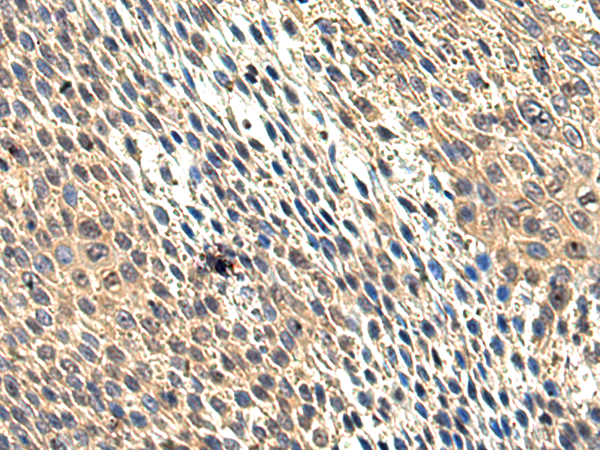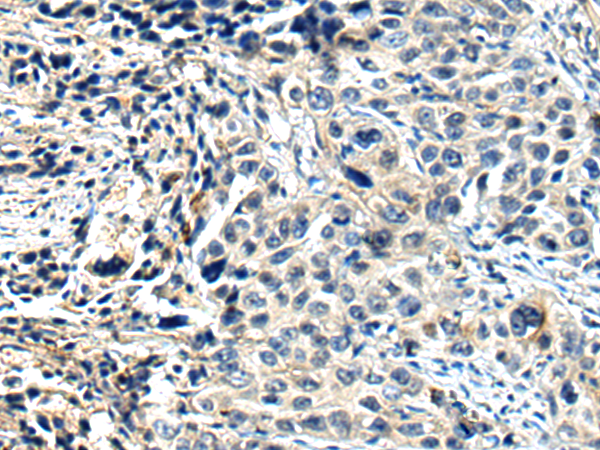

| WB | 咨询技术 | Human,Mouse,Rat |
| IF | 咨询技术 | Human,Mouse,Rat |
| IHC | 1/50-1/100 | Human,Mouse,Rat |
| ICC | 技术咨询 | Human,Mouse,Rat |
| FCM | 咨询技术 | Human,Mouse,Rat |
| Elisa | 1/5000-1/10000 | Human,Mouse,Rat |
| Aliases | HD4; AHO3; BDMR; HDACA; HA6116; HDAC-4; HDAC-A; NEDCHF; NEDCHID |
| Host/Isotype | Rabbit IgG |
| Antibody Type | Primary antibody |
| Storage | Store at 4°C short term. Aliquot and store at -20°C long term. Avoid freeze/thaw cycles. |
| Species Reactivity | Human, Mouse, Rat |
| Immunogen | Synthetic peptide of human HDAC4 |
| Formulation | Purified antibody in PBS with 0.05% sodium azide and 50% glycerol. |
+ +
以下是3篇关于HDAC4抗体的参考文献及其摘要概括:
---
1. **文献名称**: *"Histone Deacetylase 4 Governs Neural Crest Cell Differentiation and Craniofacial Morphogenesis"*
**作者**: Vega RB, et al.
**摘要**: 该研究利用特异性HDAC4抗体(通过Western blot和免疫组化验证),揭示了HDAC4在神经嵴细胞分化和颅面发育中的关键作用,发现HDAC4缺失导致小鼠颅骨畸形。
2. **文献名称**: *"Selective Inhibition of HDAC4 in Neuromuscular Disorders: Implications for Duchenne Muscular Dystrophy"*
**作者**: Cohen TJ, et al.
**摘要**: 通过HDAC4抗体染色和ChIP实验,研究发现HDAC4在肌肉萎缩中异常聚集,特异性抑制HDAC4可缓解杜氏肌营养不良模型小鼠的病理症状。
3. **文献名称**: *"Antibody-Based Detection of HDAC4 in Alzheimer’s Disease Brain Tissue"*
**作者**: Selenica ML, et al.
**摘要**: 使用高特异性HDAC4抗体对阿尔茨海默病患者脑组织进行免疫荧光分析,发现HDAC4在神经元突触中的异常定位与tau蛋白过度磷酸化相关,提示其参与神经退行性病变。
---
以上文献均通过HDAC4抗体进行蛋白定位或功能研究,涵盖发育生物学、疾病机制等领域。如需更多文献或实验细节,可进一步筛选特定研究方向的论文。
HDAC4 (Histone Deacetylase 4) is a class II histone deacetylase that plays a critical role in epigenetic regulation by removing acetyl groups from histone proteins, leading to chromatin condensation and transcriptional repression. It is involved in diverse cellular processes, including differentiation, apoptosis, and metabolic homeostasis. HDAC4 is particularly notable for its tissue-specific functions, such as regulating muscle development, neuronal survival, and bone formation. Dysregulation of HDAC4 has been linked to various diseases, including cancer, neurodegenerative disorders (e.g., Alzheimer’s disease), and musculoskeletal conditions (e.g., muscular dystrophy).
HDAC4 antibodies are essential tools for studying its expression, localization, and interactions in biological systems. These antibodies enable researchers to detect HDAC4 via techniques like Western blotting, immunohistochemistry, and immunoprecipitation. Specificity and validation are crucial, as HDAC4 shares structural homology with other HDAC family members. High-quality antibodies help elucidate its role in signaling pathways, such as its interaction with transcription factors (e.g., MEF2) or its nucleocytoplasmic shuttling modulated by phosphorylation.
In research, HDAC4 antibodies contribute to understanding disease mechanisms and evaluating therapeutic targets, particularly in HDAC inhibitor development. Their application spans basic research, drug discovery, and clinical diagnostics, underscoring their importance in advancing epigenetics and precision medicine.
×